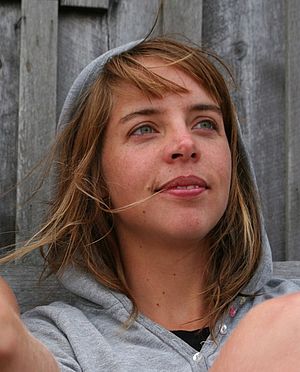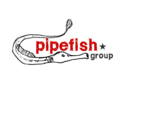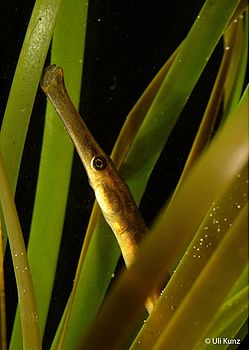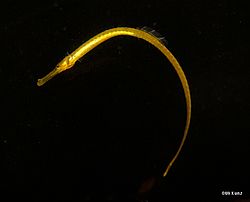
Susanne Landis
Dipl.-Umwelt-Natw.
Forschungsbereich 3: Marine Ökologie
FE Evolutionsökologie Mariner Fische
Büro:
Raum: B108
Telefon: +49 431 600-4501
Fax: +49 431 600-4553
E-Mail: slandis(at)geomar.de
Adresse:
Düsternbrooker Weg 20
D-24105 Kiel
CV
- Since August 2009 PhD student at Helmhotz Center for Ocean Research Kiel (GEOMAR) "The effect of global change on host-parasite interactions and coevolution of the broad-nosed pipefish (Syngnathus typhle) and its parasites"
- 2007 Diploma thesis with Prof. Dr. Paul Schmid-Hempel and Dr. Ben Sadd "Specific responses: profiles of infection and immune activation by Crithidia bombi isolates across host colonies of Bombus terrestris"
- 2001 - 2007: Studying environmental sciences at ETH Zürich
Research interests
Global change may result in local coevolutionary hot and cold spots that disrupt species interaction and evolutionary stable strategies. Close species interactions like the arms-race of hosts and parasites may in particular be affected by environmental variation. I want to investigate how global change will alter the specific interaction of host and parasite genotypes (Genotype x Genotype x Environment interactions). Our model system, the pipefish Syngnathus typhle and its trematode parasite Cryptocotyle lingua have a wide distribution range. We sampled pipefish with their sympatric parasites on a latitudinal gradient, mapped the distribution, divergence, relationship, and selection pressure imposed by the parasite in different populations over Europe. Molecular markers served to understand the pattern of host-parasite coevolution and local adaptation.
As a second approach, we simulated environmental variation and investigated how this affects the host-parasite arms race and local adaptation in laboratory experiments. Disturbances and extreme weathers that are associated with climate change are temperature increases, sea level rises, changes in wind patterns, storms and increases in heat waves. We simulated a heat-wave to determine infection outcome and infection intensity with host and parasite genotypes ranging from sympatric to allopatric to understand the effect of global change on host-parasite coevolution. We found that an extreme weather event like a heat wave can lead to a down-regulation of the specific immune defence in pipefish. Additionally we found a consistent pattern of local parasite adaptation in this host-parasite system.
In cooperation with Josefin Sundin from the Evolutionary Biology Centre (University of Uppsala, Sweden) we investigated experimentally how behavioural adjustments can help a pipefish host to compensate for higher bacterial prevalence, as expected due to rising ocean temperatures. We performed a temperature choice experiment with the host – parasite system of the sex-role reversed broad-nosed pipefish (Syngnathus typhle) and its bacterial pathogen Vibrio spp. Because animals can profit from increasing temperatures by prolonged breeding seasons and faster growth rates, these fitness benefits are traded-off against higher parasite load and increased virulence of temperature-sensitive pathogens. In Syngnathus typhle pregnant males are expected to face a trade-off between shortening their brooding period in warm water and decreasing the effect of the infection in cold water. We found that exposure to Vibrio changed the temperature preference for both pregnant and non-pregnant males, as well as females compared to non-challenged fish that tended to prefer warm water. This study shows that behavioral plasticity is one option for avoidance of higher bacterial prevalence, as expected due to rising ocean temperatures.
Publications
Landis SH and Sundin J, Rosenqvist G, Roth O (2012) Behavioral adjustments of a pipefish to bacterial Vibrio challenge. Behav Ecol Sociobiol: doi 10.1007/s00265-012-1395-3
Roth O, Keller I, Landis SH, Salzburger W & Reusch TBH (2012). Hosts are ahead in a marine host-parasite coevolutionary arms race: innate immune system adaptation in pipefish Syngnathus typhle against Vibrio phylotypes. Evolution, 66: 2528-2539





